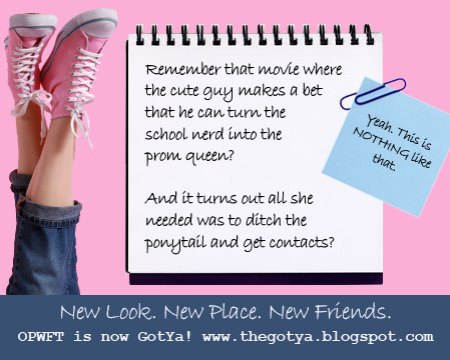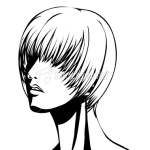Cue the Streisand music: Memories like the corners of my mind. Misty, water colored memories…of the way we were.
Psst, come here a second. I wanna tell you a secret. Closer…Okay, here it is: OPWFT is changing. Like big time–inside and out. You know how vain people can be about age, so we decided to have a little work done. So, to honor this big change, which may or may not be happening next week(I suck at secrets!) here’s a recaps of our best author interviews with NY Best Selling authors, Jay Asher, ED Baker, and Aprilynne Pike.
Here is “Best Of” Jamie’s interview with Jay Asher
Is there a part of the teenage Jay Asher in Clay Jensen? Did you know a girl like Hannah in high school? How do we see your teenage experience reflected in your characters?
Personality-wise, I was a lot like Clay in high school. And like Clay, I hardly went to any parties, though I wasn’t anywhere close to being valedictorian. I’m sure I knew plenty of girls like Hannah in high school, but I had no idea who they were…which is a big part of what I was trying to say with the book. People can appear one way, but have a lot more going on in their lives than we know about. And I wouldn’t say my teen years are represented in the book very much. When I began writing, I talked to a lot of my friends about their teen years, and those (much more interesting) years are what you’ll find in the book.
What is your favorite scene in THIRTEEN REASONS WHY?
A: My answer to that question changes periodically. For pure creepiness, I like the scene where Hannah’s outside the Peeping Tom’s window. I like the subtlety in the interaction between Clay and his mom at the diner. But my favorite scene to write was the one where Hannah and Clay kiss. The kiss didn’t last long, but after everything I’d put them through…and was about to put them through…I really wanted that moment to last forever.
How much research on teen suicide did you do before writing THIRTEEN REASONS WHY?
A: Not very much scholarly research. I talked extensively to my relative about her frame of mind leading up to her attempt, and I went to a couple suicide prevention forums (which I’m now a featured speaker at!). I simply began writing when I felt I understood the emotions and the point-of-view of someone like Hannah enough to tell her story confidently. I wanted the story to be led by her as a full character rather than a bunch of research. But after I wrote a draft, then I read books on teen suicide, spent many hours doing online research, and went back to enhance certain aspects of the story.
What is the message you would like your readers to take from your book?
A: Primarily, the book’s about the small things we do that impact the lives of others. And since we don’t fully know what’s going on in anyone’s life but our own, there’s no way to know exactly how they’re going to be affected by what we do. It was also important to show that Hannah didn’t do everything she should have to get the help she needed. I hear from a lot of teens in Hannah’s position who say they were inspired to get help because they recognized they were making the same mistakes as Hannah.
For fellow writers, I’d like to ask about your journey to publication and writing style. How long have you been writing? Was THIRTEEN REASONS WHY the first manuscript you completed and queried to agents?
A: It was far from my first completed manuscript. From the time I began submitting to when I finally sold something, twelve years had passed…and three agents had come and gone. But this was my first teen novel, as well as my first non-humorous manuscript, so I think I stumbled around until I found my voice with this book.
Best piece of advice for aspiring authors?
A: Join a critique group. You want one that’s honest and made up of people with similar goals. If they enjoy writing but don’t absolutely want to get published, they’re not going to push you as hard as a group of writers battling to be the first one published. But they should also be extremely supportive, and it helps if someone in the group bakes cookies!
What kind of networking do you do, and how do you interact with your readers?
There’s a website for my novel, set up by my publisher (www.thirteenreasonswhy.com), and a lot of people leave comments there. I also have a blog (www.jayasher.blogspot.com). But most of my interactions come from my MySpace page (www.myspace.com/jay_asher). My favorite part of every day is when I check my MySpace mailbox. I get messages from teens and librarians all over the world…and I answer every one, unless they have a blocked account. (Note: if you ask for a response, UNBLOCK YOUR ACCOUNT!!!). And I absolutely love doing school visits. The face-to-face interaction is amazing!
THE BEST OF HOLEN’S INTERVIEW WITH ED BAKER
In The Frog Princess, the classic cure for Eadric, the frog prince goes a bit awry. Princess Emma kisses him, and instead of finding a prince, she finds herself a frog. I could see this turning dark – it’s a dangerous life as a frog – but you went for a wonderfully funny adventure. Was that ever a conscious decision? Or more of a reflection on your natural voice?
I prefer writing funny stories rather than dark. I’ve always thought that it’s harder to write something that amuses people, considering how subjective “funny” can be, and I’m thrilled when readers tell me that my books are funny.
One of the things I like about the Frog Princess series is how clean it is. Everyone can enjoy the books without worrying about content issues. I heard about your books from my mother-in-law and recommended your books to a 10-year-old. Who do you think of as your target audience?
I’ve been told that my books are for ages eight and up, but the youngest reader who has written to me was six years old and I continually hear from teens and adults, including college students, parents and grandparents.
Counting Dragon Kiss, which comes out this month, you’ve got eight published books, one of which has been adapted into a movie. How did you go from unpublished writer to multi-published, author with Disney’s attention?
I received many rejection letters before Bloomsbury accepted my first book, The Frog Princess. Disney began the optioning procedure shortly after The Frog Princess came out, then renewed their option several times until they finally exercised the option and made their own version of the story. In the meantime, I had continued the series as well as written some unrelated books.
It seems like you have a new book out every year. What’s the big picture writing cycle like for you?
I am trying to write two books a year, but I’m not sure how long that will last. Writing the Frog Princess books is relatively easy for me now, because I know the world and the characters so well. Writing unrelated stories is harder because I have to create the world and the characters, then get to know the characters well enough that I know how they will act in a given situation. I generally know what the next five books will be and think about them for a few years before I actually begin writing them. Occasionally I switch around the order in which I write them, either because of fan demand or my publisher’s interest.
Now a couple quickies: Which of your characters is your favorite?
In the tales of the Frog Princess, I’d have to say Emma, Shelton and Li’l, although I had a lot of fun writing about the trolls and the water monsters living in the troll mountain in No Place For Magic. I also really like Lamia Lou in Wings.
I’ve written a book that is unrelated to any other and is due out next summer. I have just sent off my latest round of revisions and I have to say, this book may well be my best story yet. The main character, Annie, is another of my favorites.
* If you have a question not here, you’ll likely find it on E.D. Baker’s FAQ page of her website or on her blog.
THE BEST OF KRISTA’S APRILYNNE PIKE INTERVIEW
Writers often draw on their real life experiences. Is there a little of Aprilynne in Laurel? Or are there other people in your life who influenced David or Tamani?
There is a little bit of Laurel in me in that I moved schools twice during my freshman year of high school and was the new girl in both a huge school and a tiny school, and became very familiar with the challenges those both entailed. I really don’t have anyone who influenced either Tamani or David. I set out to make two different versions of the perfect man. Everyone always asks which guy is my husband, but I’m afraid my husband is yet a third version of the perfect man.:D
*Sighs. Aprilynne is a lucky woman…literary success and the perfect man!
When I first started on AW, I stalked—er, followed, your blog religiously. What has blogging meant to you and to your writing career?
Blogging is a way to more intimately share my journey with readers. And not even always readers. A lot of my blog followers are aspiring authors who may or may not have read my book. I started out as a new writer with no credentials and one contact who recommended me to her agent who promptly lost my manuscript. Now I am a (it still feels weird to say this) bestselling author with a movie in the works and sales to 20 foreign countries! Holy s*&^!! I have blogged from the very beginning and I am hopeful that other aspiring authors will see that if I can do it, they can too. It takes work. Usually a lot of work, but it can be done–I’m living proof. And so are several of my blog readers now, which–although i know I did not contribute directly to them being published–makes me very proud!
Even in your wildest dreams, could you fathom the success that Wings has garnered?
Never. I knew that Harper had big plans for me–that was enough of a surprise. And since I really wanted writing to be my career, I knew i wanted to make a splash. But never, ever, even in my pipe dreams, did I think I would hit number one with my first book, or that I would sell movie rights so soon, and in such a star-studded way. I am meeting goals now that I did not even consider meeting until several books down the road. It has been one amazing surprise after another!
Stephenie Meyer is a friend of yours. Although there is a rabid and vocal fan base of Twilight, there are also those who are very critical. How do you handle critical reviews? Is it hard for you to hear criticism of fellow writer friends?
I am a firm believer that a certain percent of readers in this world, are going to be haters. I have lots of haters. But I turn that around and say that I have lots of haters because I have lots of readers. I also get a lot of really wonderful fan mail and that helps to balance out the two.
Critical reviews–those, in my opinion, are not hard to handle. Truly critical reviews are smart and well-thought. They point out flaws in your book and–if you are honest with yourself–make you think, hmmm, they are probably right. I have tweaked issues in book two because of smart reviewers who saw somethign that I didn’t. And I am grateful to them for pointing it out! Then there are reviews where the book simply didn’t speak to the reader, it wasn’t their thing. Those are okay too. Different strokes for different folks as they say. I certainly don’t expect everyone to like my book. I don’t like every book that I read either. The ones that tend to bother me are the ones where the reviewer clearly either wants to hate your success (usually these reviewers who are aspiring authors and you can just see them going, “But, but, but MY book is better than THIS!”) or have a friend who is “in competition” with you (I have several of those too.) Those reviews are not fair, and they tend to be louder and more publicized. But even when I run into something like that, I just have to shrug and move on and remember that they fit into the haters percentage too. They are just more verbal.:)
It probably harder for me to see people hating on books that are writen by friends than my own because I have discovered that I am, for some reason, better at shrugging off haters than most of my friends (and waaaay better than my husband; he is my knight in shining armor.:)). So when I read a really hateful review of a friend’s book, I know that it hurts them and it makes me want to lash out. I don’t . . . usually, but it’s the Mama Bear instinct in me.:)
There seems to be a booming population of Mormon’s in the YA Fantasy genre. As a spiritual person whose faith sometimes bleeds over into her work, does your faith influence your work, or do you keep it entirely separate?
I try to keep it entirely separate. I keep religion out of my novels because I don’t want my readership to be limited by their religion. Teen experiences are teen experiences, no matter what you faith or lack thereof dictates. I tend to make my main characters either non-religious or religiously-apathetic.









